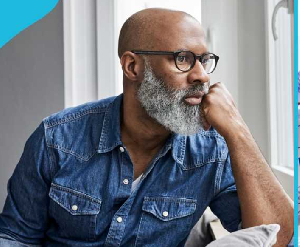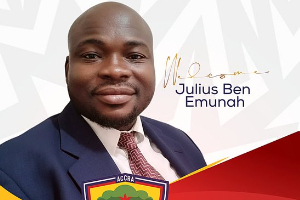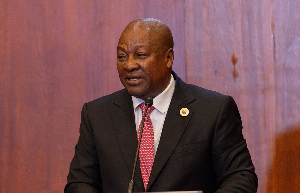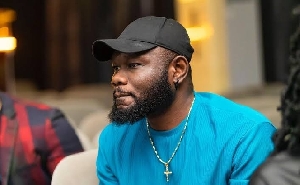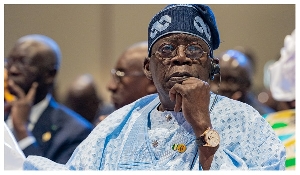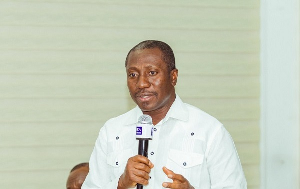Opinions of Wednesday, 3 May 2006
Columnist: Agbodza, Paul
Ethnic Hegemony Or Racism?
In August 2003, a New Zealand Broadcaster cast a racial slur on the great Ghanaian-born Secretary-General of the UNO. The response from the Secretary-Generals country-women and men was as expected. Insult the Ghanaian? Then I told myself: history is repeating itself. The Sadducees and Pharisees who were sworn enemies conspired to trick Jesus. Jesus was their common enemy. The common enemy of the Sec Gen?s country-women/men was the poor Commentator. Then I asked myself what moral justification do we have to condemn someone who insults our countryman? We do the same among ourselves. What justifications have we to fight anyone who insults the Ghanaian Sec Gen when we rain insults on others from his ethnic group?
I was born an Ewe (alias Ayigbe) without my knowing it. I had no choice if I wanted to be dark-skinned or light-skinned. I had no choice if I wanted to be Ayigbe or Awonani or Kusasi or Asanteni. I had no choice if I wanted to be female or male. I had no choice if I wanted to be a ?villager? or a city-dweller. I had no choice if I wanted to be born where there is gold or salt, where there is the sea or just a river; I had no choice if I wanted to be born where the land is always green or where there is perpetual desert. I do not regret anyway that I am born what I am neither do I regret where I was born.
This notwithstanding we find ourselves in a society where our first word is judged as good or bad depending on our situation in life. This smacks of an ad hominem fallacy. A Jewish writer wrote long ago: ?The fathers have eaten sour grapes, and the children's teeth are set on edge? (Ezekiel 18:2). I am described as inward looking because my fathers were described as such. After several years I am incapable of being outward looking granted that the first premise were objectively true and not just subjective. If I were from the North of Ghana, I would be considered backward and warlike because the fathers have been engaged in ?justifiable? wars. No one wants to lose his land and property anyway.
When I was growing up I lived among several Ghanaian ethnic groups. I remember that as a child my Akan friends often called me Ayigbeni-aboa or sometimes Ayigbe-djulor if there was a quarrel, which one cannot discount among children. And if anything was stolen or lost, then I was the first suspect. I had lived in Bawku as a child. One day we were caught between the battle-line during one of the numerous chieftaincy disputes in Bawku. Then as children we ranted and cursed our neighbours because we considered them warlike. These were all stereotypical profiles.
In peaceful times the people of Bawku were extremely generous. When we went through the groundnut fields of Bazua or near Bawku Secondary School, the women would generously offer us groundnut as much as we could chew. Guinea fowls were in superabundance. Fresh cow milk was a delicacy. The Northerners had nutritious food. The White Volta was such a sight at Mognori. These have had a lasting impression on me. Ghanaians living in the Northern and Upper East regions are extremely generous people. They love people. My friends in the North would always laugh at us because we (from the South) ate snails. Then we would in turn laugh at them because of Tuo zaafi. But these were childhood pranks. It was even later I discovered that even among the Akan groups there is a yawning gap. Who would fill this gap? Among the Ewes, the gap is wider. The Central Ewes do not agree with the Southern Ewes. The Guan groups in the central Volta Region are wider apart from the rest of the Volta Region.
I grew up rather loving other ethnic groups in Ghana. And I am also proud that I can speak four Ghanaian languages. But as we grow up, when faced with hostilities because of our ethnic origins then we are forced to abandon our childhood admiration of other ethnic groups.
There is a theory I have developed: Ghanaians who have never lived in a boarding school; Ghanaians who can never speak other Ghanaian languages apart from their own; Ghanaians who have never lived in other parts of Ghana apart from their home regions would be the greatest protagonists of ethnic hegemony (or in the language of the man on the street ?tribalism?).
The second theory runs like it: Ghanaians who are not well-educated (by Western standards) are more likely to be protagonists of ethnic hegemony. Or if they were well-educated but had bad history lessons then they were dangerous. Well, I do not know if I should still hold this theory in view of pronouncements of some great Ghanaian scholars.
The third theory runs like this: Ghanaians in the Diaspora who had never lived in other parts of Ghana before travelling outside Ghana, would measure 4.0 on a 5-point scale of who is ?tribalistic? and Ghanaians currently at home would measure 3.0.
For my third conclusion, I am currently making a profile (with statistical tools) of the comments of readers of ghanaweb on particular issues (especially those bordering on ethnic issues and politics). Even without completing my project I have a faint idea of those who have never attended a boarding school outside their home regions. I can tell those who are well-educated from those not. I can tell those who are illegal immigrants from those who are legal immigrants. Unfortunately, I may not get their IP addresses to be able to tell which countries they are writing from.
I listened to a discussion where a friend said most Ewe children are changing their names to Akan names in order to get jobs or enter the Universities. Another speaker said, in the 1990s it was the opposite. But this is just an exaggeration.
In my estimation therefore ?tribalism? is equal to ethnic hegemony and equal to racism. The only way to overcome racism or tribalism is to refuse to be one. I believe if any Ghanaian in the Diaspora is treated badly because she/he is dark-skinned, it tells on her/him emotionally. Therefore, treat other ethnic groups with respect if you do not want any other race to treat you scornfully just because of your race.
Historical events have already happened. This is the time to qualify such events and allow the current generation to move forward. For how long should I as ?Ayigbe? continue bear the sins of Ewe politicians? For how long should the Ashanti man bear insult because of the historical clashes of her/his ancestors with other ethnic groups? For how long should Ghanaians living in the Northern part continue to be looked mean upon?
After all do we not find some of the greatest individuals who have made Ghana proud among all other ethnic groups? Take the Great Asantehene! He exhibits pure culture at its best. When he visits a country that I live in, I shall go and meet Him because he represents a culture that I can identify as Ghanaian. Look at the Northern Kings, they ride on horses. They are royals. Let other ethnic groups equal this.
From hence, allow me to be just a Ghanaian and nothing more. Leave politicians to play on our ethnic differences and blame them alone. Leave the ?tribalism? game. Let us fight our common enemy: poverty, disease, short life expectancies at birth and waste of hard-earned money on funerals?. If our generation would shun tribalism, our forebears would die with it, and we shall live in a Ghana for One People and a Common Destiny. Ten years to come there would be politics in Ghana not tied to ethnic groups because ?tribalism? would be no more!!!
If you care, you can send me a response to these two questions, and give a short reason for your choice:
1. Would you vote NDC if Pres. Kuffour were presidential candidate?
2. Would you vote NPP if Ex-Pres. Rawlings were presidential candidate?



